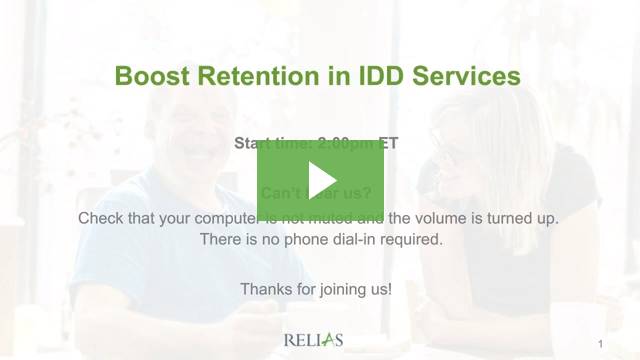In many parts of the healthcare industry, the use of personnel assessments in hiring, placement and development is widespread. But these data-powered tools are new to most organizations that provide services to people with intellectual and developmental disabilities.
The workforce shortage facing the IDD industry makes the use of personnel assessments critically important. When providers don’t have the luxury to be picky about who they hire to be direct support professionals (DSPs), knowing as much as possible about their employees and providing them with the right training is essential.
Let’s walk through how assessments work throughout the employee lifecycle.
How assessments can improve onboarding and placement
IDD providers can give new DSPs two types of personnel assessments.
One is a job knowledge assessment, which is a test of an employee’s understanding of the knowledge and skills essential to the job. For a DSP, such assessments would look at their understanding of person-centered service delivery, personal care, and support for activities of daily living.
You would expect a DSP who is new to direct care to score poorly on job knowledge assessments, indicating that they need to go through the full, in-depth onboarding curriculum. But for new employees with prior experience, job knowledge assessments provide data you can use to craft an onboarding curriculum that gives them credit for what they already know. This is one of the key components of effective learning for adults – respect their experience and don’t make them waste time in trainings they don’t need.
Condensing some parts of your onboarding curriculum based on assessments gives you a time to dive more deeply into topics that will be particularly relevant to the employee’s new position. For example, you could provide them with in-depth training on the condition of an individual they will be working with. Or you can save time and money by shortening the onboarding process and getting that employee working with the people you serve more quickly.
New hires in the DSP role can also take a situational assessment, which provides data regarding characteristics essential to success in the position. For DSPs, those characteristics are compassion, reliability, empathy and judgment.
These results are especially useful for assigning a new DSP to an experienced DSP for job shadowing or mentoring. You can match the new hire with someone who has demonstrated, in their work or on the assessment, strength in the characteristics where the new hire is weak. You may also decide that a new hire who is especially weak in any of the four characteristics should work in a setting where they have support and oversight, like a day program, rather than putting them in a position where they will often work unsupervised, like an in-home service provider.
Using personnel assessments to improve training and development
Job knowledge assessments enable you to catch knowledge gaps before they turn into costly mistakes. A poor score on documentation is a signal to review that employee’s paperwork and provide a one-on-one session to go through the rules and requirements. But a poor score on something like medication assistance or crisis prevention – those are knowledge gaps that need immediate attention in order to protect the wellbeing of the people you serve.
Assessments can be used to guide a DSP’s path at your organization. Many DSPs work in isolation or in situations where their supervisor rarely witnesses the attention and care they put into their work. Situational assessments, in combination with job knowledge assessments, performance evaluations and other personnel records, can help your human resources manager identify strong candidates to be mentors or to serve in leadership positions.
Who you promote, recognize and reward in your organization sends a strong message to the rest of your staff. Advancing those DSPs who demonstrate compassion, empathy, reliability and judgment lets your employees know that those are the characteristics that the organization values. You can inadvertently send the wrong message by advancing someone who is, for example, well-liked and friendly but who his co-workers know is unreliable. Situational assessments can help you avoid that pitfall.
Personnel assessments give you data to guide decisions that have a tremendous impact on the quality of your services. Unfortunately, some IDD organizations become known for hiring any “warm body” in an effort to fill positions ASAP. With assessments, you can make more informed onboarding, placement and training decisions so your organization becomes known for having the right people in the right positions with the right supports.

WEBINAR: How to Boost Retention in IDD Services
High turnover is a challenge facing many organizations that provide services to people with IDD. Learn more about how personnel assessments can help you hire better employees and retain your best employees – particularly in direct care and front-line supervisor positions.
Watch Now →





